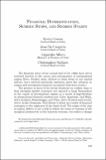Artículo
Financial diversification, sudden stops, and sudden starts
Date
2008Abstract
The financial crises of the second half of the 1990s have led to renewed interest in the causes and consequences of international capital flows. Sudden stops, defined as large drops in net capital inflows, have received particular attention, given the collapses in output and investment commonly associated with these events. The premise in most of the recent literature on sudden stops is that emerging market economies are exposed to large fluctuations in the supply of international capital, as a result of imperfections in international financial markets (see Calvo, Izquierdo, and Mejía, 2004, Guidotti, Sturzenegger, and Villar, 2004, Frankel and Cavallo, 2004). In this literature, Wall Street is either the carrier of financial contagion or the originator of the shock itself.
Collections
View/


